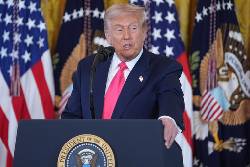Thousands of documents released by the House Oversight Committee offer a new glimpse into what Jeffery Epstein’s relationships with business executives, reporters, academics and political players looked like over a decade.
They start with messages he sent and received around the time he finished serving his Florida sentence in 2009 and continue until the months before his arrest on federal sex trafficking charges in 2019.
During that time, Epstein’s network was eclectic, spanning the globe and political affiliations: from the liberal academic Noam Chomsky to Steve Bannon, the longtime ally of President Donald Trump.
The emails don't implicate his contacts in those alleged crimes. They instead paint a picture of Epstein’s influence and connections over the years he was a registered sex offender.
Here's the latest:
German officials tight-lipped on left-wing group’s terrorist designation
Antifa-Ost — a German network suspected in attacks on people it perceived as fascists — was among four European left-wing groups designated as terrorist organizations by the Trump administration Thursday.
Foreign Ministry spokesperson Josef Hinterseher said at a regular news conference in Berlin that his ministry has “taken note” of the designation. Asked whether the German government was contacted beforehand, he replied that “the U.S. decided independently on this.”
Interior Ministry spokesperson Sarah Frühauf said “we don’t evaluate the decisions and assessments of other states, so I also have no assessment of whether we consider this proportionate or disproportionate.”
Trump’s Friday schedule
Trump does not have any pubic events on his schedule for today, but this evening he will travel to Mar-a-Lago.
Trump administration designates 4 left-wing European networks as terrorist organizations
Trump’s administration on Thursday designated four European left-wing groups as terrorist organizations, following through on his vow to crack down on leftists after the assassination of conservative activist Charlie Kirk.
The networks targeted by Trump’s administration all appear to be based in Europe, with no operations in the U.S. They are an Italian anarchist front that sent explosive packages to the then-president of the European Commission in 2003, two Greek networks believed to have planted bombs outside riot police and labor department buildings in Athens, and an anti-fascist group whose members were prosecuted by German authorities for a hammer attack against neo-Nazis in Dresden.
Europe has a long history of left-wing political violence, while in the United States political violence has been more likely to come from the right in recent decades, according to multiple studies, including by the Justice Department. However, there’s been an uptick in American political attacks across ideologies in recent years, culminating in the September fatal shooting of Kirk by a gunman who prosecutors contend was driven by hostility toward Kirk’s stance against transgenderism and other positions.
▶ Read more about the networks
Trump administration says it has trade frameworks with Argentina, Ecuador, El Salvador and Guatemala
The frameworks are about increasing the ability of U.S. firms to sell industrial and agricultural products in these countries, according to a senior administration official who insisted on anonymity as a condition for briefing reporters on a call about the agreements.
The White House also released statements on the frameworks, which have yet to be finalized and are expected to be signed within roughly two weeks. It’s all part of a broader effort by President Donald Trump to rewrite the rules of global commerce through the use of broad tariffs.
President Javier Milei of Argentina hailed his country’s first bilateral trade framework with the U.S. in nearly a decade as “tremendous news.”
“As you can see, we are strongly committed to making Argentina great again,” he said.
▶ Read more about the trade frameworks
Epstein kept a diverse political network
Epstein emailed current and former political figures on all sides, sending news clips and discussing strategy or gossip often in short, choppy emails laden with spelling and grammatical errors.
In several emails in 2018, Epstein advised Bannon on his political tour of Europe that year after Bannon forwarded Epstein a news clip that the German media underestimated Bannon and that he was “As Dangerous as Ever.”
“luv it,” Epstein responded.
Epstein wrote that he’d just spoken to “one of the country leaders that we discussed” and that “we should lay out a strategy plan. . how much fun.”
Just a few months earlier, Epstein was insulting Trump — whose movement Bannon was a representative of — in emails to Kathryn Ruemmler, the former White House counsel under President Barack Obama.
Ruemmler sent a message to Epstein calling Trump “so gross.” A portion of that message was redacted, but Epstein replied, “worse in real life and upclose.”
▶ Read more about the emails
Epstein said Trump ‘knew about the girls,’ but it’s unclear what he meant
Trump and Epstein were friends for years but at some point had a falling out, even before underage girls started to come forward to accuse Epstein of sexual abuse.
Journalists sometimes reached out to Epstein, perhaps hoping he might have dirt to spill on Trump. One of those writers was Michael Wolff, who has written extensively about Trump. In a 2019 email to Wolff, Epstein mentioned that one of his best-known accusers, Virginia Giuffre, had worked at Trump’s Mar-a-Lago club.
“She was the one who accused Prince Andrew,” Epstein wrote.
Giuffre, who died by suicide earlier this year, had said that Epstein’s longtime companion Ghislaine Maxwell recruited her from Mar-a-Lago to give sexualized massages to Epstein. And Trump had long claimed that he banned Epstein from coming to Mar-a-Lago.
Epstein said in an email to Wolff that Trump hadn’t asked him to resign from the club, because he hadn’t been a member.
“Of course he knew about the girls as he asked ghislaine to stop,” Epstein added.
▶ Read more takeaways from the newly released emails
Epstein emails reveal enduring ties with influential figures even after his sex crime conviction
By the time Epstein pleaded guilty in 2008 to soliciting prostitution from an underage girl, he had established an enormous network of wealthy and influential friends. Emails made public this week show the crime did little to diminish the desire of that network to stay connected to the billionaire financier.
Thousands of documents released by the House Oversight Committee on Wednesday offer a new glimpse into what Epstein’s relationships with business executives, reporters, academics and political players looked like over a decade.
During that time, Epstein’s network was eclectic, spanning the globe and political affiliations: from the liberal academic Noam Chomsky to Steve Bannon, the longtime ally of President Donald Trump.
Some reached out to support Epstein amid lawsuits and prosecutions, others sought introductions or advice on everything from dating to oil prices. One consulted him on how to respond to accusations of sexual harassment.
Epstein was charged with sex trafficking in 2019, and killed himself in jail a month later. Epstein’s crimes, high-profile connections and jailhouse suicide have made the case a magnet for conspiracy theorists and online sleuths seeking proof of a cover-up.
▶ Read more about the emails
...


